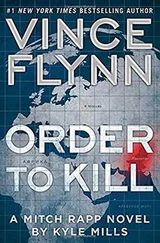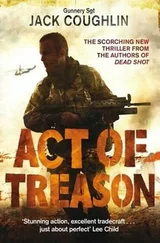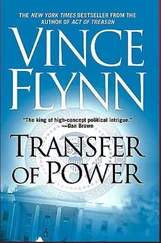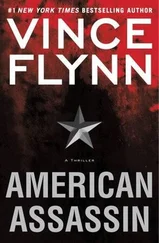This had to be Alexander Deckas, and if he knew about the guy in the car it was likely he knew about the other two men who were looking for him. That was where his focus would be-either trying to avoid them or coming to kill them. Based on what he had just witnessed, Rapp felt it was the latter. But why the apartment building? Rapp thought back to the big guy who earlier in the day he had spied stuffing money in the shirt pocket of the old man who ran the café. The old man did not appear overjoyed to be talking to the goon. It was likely that they had leaned on him. Probably threatened him in some way. The old guy had several choices at that point: play along, go to the authorities, or tip off his tenant. And if the tenant was in fact Alexander Deckas, or whatever his real name was, and the old man knew what he did for a living, why wouldn’t he go to him? Rapp had just watched him dispatch a hired gun in the middle of a busy commercial district without raising even the slightest suspicion.
Rapp’s thoughts were interrupted by the ringing of his phone. He assumed it was Coleman or Brooks so he pressed the button on the earpiece and said, “Where are you guys?”
“It’s Marcus, Mitch.”
Marcus Dumond was a computer expert who worked Counterterrorism for Langley.
“What’s up?” asked Rapp.
“I just spoke to a buddy at the DGSE.” Dumond was referring to the Direction Generale de la Securité Exterieure, France ’s top external intelligence organization. “They have a line on this Alexander Deckas. They say his real name is Gavrilo Gazich. He’s a Bosnian who cut his teeth during that nasty little thing they had over there.”
Rapp stepped away from the wall and looked out the window. “Lovely. What else did they tell you?”
“He’s wanted in The Hague.”
“For war crimes?” Rapp asked somewhat surprised. “How old is he?”
“Thirty-five.”
“Well he couldn’t have been more than a grunt when they were killing each other back in the mid-nineties.” Rapp checked the windows on the apartment building across the street. “Why in the hell would they mess with someone so far down the chain of command?”
“He was a sniper. I guess he shot over fifty civilians when they laid siege to Sarajevo.”
Rapp’s entire body went rigid for a split second and then he casually walked away from the window. It took him a few seconds before he even took a breath, and then he swore out loud.
“What’s wrong?” asked Dumond.
“Next time you might want to get to that part first.”
“What part?”
“Never mind,” Rapp growled. “What else do you have on him?”
“He’s rumored to have operated in Africa, mostly the east side… Sudan, Ethiopia, Uganda, but they don’t have anything concrete on him.”
“How about a photo?”
“Yeah, but it’s not very good.”
“Good enough to give us a match on the surveillance tape?”
“Not a definite, but it doesn’t exclude him either.”
“All right. Send this stuff over to the Africa Division and see what they have on him.”
“Will do.”
“And see if you can get the evidence The Hague has on him. I want to know how good of a shot he is.”
“I’ll get on it.”
“Good work, Marcus.”
Rapp pressed the button on the earpiece and disconnected the call. Very few things rattled him, but snipers were one of them. Sneaky little bastards. The good ones could kill you from nearly a mile away. That was hardly a fair fight. Rapp sat motionless in the dark hotel room and tried to process the new information. Would this guy have any idea Rapp was looking for him? The answer was probably not. Rapp had been very careful, and other than Coleman’s team and a few select people in Washington, no one knew he was on the case.
Rapp wondered if there was a chance these other guys had worked with Gazich in the past. Maybe, but for some reason Rapp doubted it. These assassins were usually loners out of necessity. They couldn’t afford to trust anyone else. Rapp had met the type before: former soldiers and paramilitary types, who always performed better on their own than they did within a unit. Rapp knew because he was one of them. Then there were also what the CIA euphemistically called thugs, drugs, and outlaws. Guys who came out of the ranks of organized crime and the drug cartels. These guys typically didn’t operate alone. They traveled in packs like hyenas.
It was the old man. He was the key. These goons, whoever they were, had leaned on him, and like a good Greek, the old man played along all the while plotting their demise. He alerted his tenant, who just happened to be an assassin, that these guys were looking for him and now the problem was in the process of going away in a very permanent manner. What would Gazich’s next move be? If he was in fact a trained sniper, his options were plentiful. The specter of this guy sitting on the rooftop of the apartment building with a high-powered rifle and night scope made the hair on the back of Rapp’s neck stand up.
It occurred to Rapp that the other two guys probably were not as disciplined as he was. It was likely that they were sitting around, with the lights on, watching TV and waiting for their guy on the street to let them know the target had showed up. Rapp moved to the edge of the window and looked down at the car. He could barely make out the silhouette of the dead man sitting in the front seat. Nothing had changed. No one had gone down to investigate. With only his left eye peering out from the edge of the curtain, Rapp scanned the roofline of the apartment building that Gazich had entered a few minutes ago. Everything looked normal. At least as far as he could tell, but a good sniper would have no problem concealing his position. The possibility occurred to Rapp that the other two guys might already be dead. If the angle was right, and they had their window opened like Rapp did, it would be an easy shot.
Rapp was scanning the rooftop again when a flash of movement caught his eye. Someone was on the roof next to the apartment building. Rapp’s room was on the fourth floor of the hotel. All of the buildings across the street were three stories high and their flat roofs pretty much matched up to within a few feet of each other. Rapp saw the movement again. Someone was moving from Rapp’s left to right, toward the café. Rapp leaned out to get a better look and saw a shadowy figure make the short hop from the building onto the roof where Gazich’s business was located.
Rapp smiled as he realized his instincts had been correct. When he’d checked out the building earlier in the day he questioned why their guy would set up shop on the third floor of a building that had no side or back alley. The only way out was through the front door. Not exactly code back in the States, but over here where the streets had been laid out thousands of years ago, they had to make do. It was almost unthinkable for a guy like Gazich to back himself into a corner with no avenue of escape. The answer was that he hadn’t. Gazich’s escape route was the roof. From there his options were plentiful.
Rapp’s eyes searched the darkness for more movement, but there was none. The roof was dotted with air-conditioning units as well as some ventilation pipes and a few other things. He assumed Gazich was hiding behind one of them, or that he had crawled over to the edge where there was a lip. Suddenly, the front left window on the third floor lit up. A few seconds later the silhouette of a man appeared on the cream colored shade. Rapp realized the access hatch must be located behind one of the air-conditioning units.
“Why the hell would you turn on that light?” Rapp asked himself.
The silhouette moved about, disappearing and then coming back into view. It looked like he was gathering something. Even so, Gazich had to know these guys were watching him. This made no sense. He could have easily snuck in, used a small penlight to get what he needed, and go back out through the roof without anyone ever knowing he’d been there.
Читать дальше












